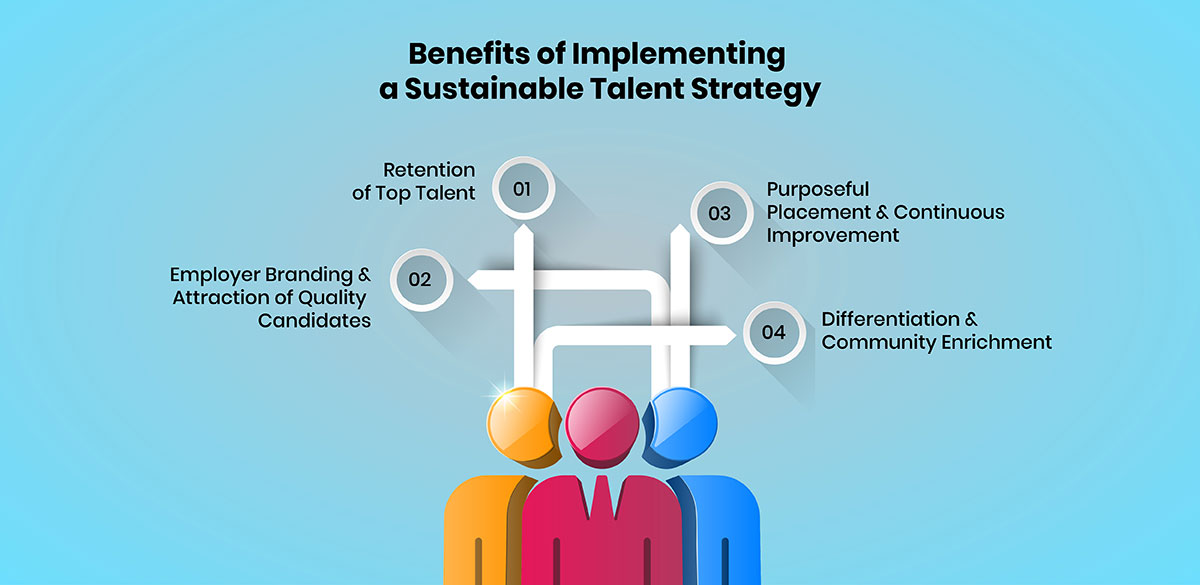
While sustainability has increasingly become a business imperative, successfully embedding these principles requires looking beyond environmental initiatives to how organizations attract, develop, and retain talent. A strategic approach to talent management is key to steering businesses towards long-term success by equipping the workforce with sustainability skills and mindsets. This article explores sustainable talent management practices for measuring talent, cultivating adaptive employees, and fostering lifelong learning.
Traditionally, talent planning focused on headcount forecasts and growth allotments within functions. However, as sustainability concerns come to the fore, businesses must shift from merely acquiring talent to curating it. An inclusive, skills-based approach upholds environmental and social responsibilities while preparing employees for an uncertain future. The following sections discuss how organizations can integrate sustainability into core HR functions and cultivate talent committed to enduring economic, social, and planetary well-being.
Sustainable Talent Management Practices
The following are the sustainable talent management practices:
-
Aligning Hiring with Sustainability Goals
Central to embedding sustainability is aligning talent acquisition with overarching goals. Rather than standard hiring assessments, recruitment processes should evaluate passion and experience in addressing social and environmental challenges. Targeted questioning seeks individuals innovatively driving change through STEM abilities and sustainability-focused roles.
Assessing candidates' views on pressing issues and potential contributions to initiatives ensures new hires are qualified and aligned with the vision. Embedding these values from the start helps the organization develop a sustainable culture and DNA. For example, an AI startup assessing technical skills could also explore views on responsible data usage and algorithmic bias. Aligning shortlists to long-term impact areas like clean energy, accessibility, and justice promotes hiring those intrinsically committed to the mission.
-
Reskilling and Upskilling the Current Workforce
While recruitment focuses on bringing in the right external talent, it is also crucial to reskill and upskill the existing workforce. Investing in the continuous learning and development of current employees demonstrates their significance and prospects for growth within the organization. Large-scale reskilling programs akin to IBM's initiative help staff gain flexibility and expertise across transforming landscapes.
Leveraging data-backed insights into existing skill sets and future needs avoids narrow categorizations, empowering employees to custom-build lifelong learning journeys. Reskilling boosts capability beyond delineated roles and preps the workforce for navigating volatility. Complementing formal training initiatives, organizations must foster cross-skilling through collaborative initiatives that blend diverse perspectives.
-
Facilitating Cross-Skilling and Mentorship
Complementing formal training, cross-skilling taps diverse perspectives through collaboration. Drawing on core strengths while exposing complementary capabilities cultivates a culture of learning. Additionally, mentorship programs pair seasoned employees with those exploring sustainability-relevant fields. Guidance from credible experts navigating industry changes imbues emerging skills with valuable nuances.
-
Fostering Flexibility and Inclusion
Anticipating future skill needs amid volatility requires versatility. Outsourcing non-core functions and leveraging flexible pools and platforms supplement permanent staffing. When ethically managed, this provides opportunities for those constrained by traditional employers, like caregivers or persons with disabilities.
Complementing flexibility and inclusiveness instills belonging across backgrounds. An environment where all feel respected and supported optimizes individual potential. Inclusion also future-proofs by accessing diverse problem-solving approaches. Policies upholding diversity and psychological safety broaden recruitment pools and ideas.
-
Measuring Sustainability-Focused Talent
Annually assessing hard capabilities through Key Performance Indicators (KPIs) and feedback overlooks intangible strengths. A developmental approach measurably evaluates attributes like adaptability, systems-thinking, and resilience at frequent intervals.
Metrics gauge employees' understanding of interconnected challenges and drive for impact beyond financial targets. Qualitative assessments capture motivations, perspectives on inequality, and visions for creating shared value. Combining quantitative and qualitative views holistically identifies individuals primed for leadership in sustainability transitions.
-
Embedding Sustainability in Performance Management
Goal-setting in sync with environmental and social priorities commits all to sustainability execution. Cascading high-level targets into specific, time-bound deliverables with reviews anchors progress measurement. Recognizing contributions to pertinent United Nations Sustainable Development Goals (SDGs) through awards and promotions strengthens accountability.
Outplacement and sustainability-oriented alumni networks help transitioning talent apply expertise to worthwhile ventures. Simultaneously, exit interviews offer developmental feedback and ensure attrition stems from fit issues rather than a lack of support.
Embedding these best practices systematically blends talent management with sustainability execution. It cultivates workforce versatility, ownership, and leadership indispensable for navigating volatile transitions toward an equitable, low-carbon future.
Benefits of Implementing a Sustainable Talent Strategy
A sustainable talent strategy yields far-reaching benefits for organizations by aligning their workforce with sustainability goals. With sustainability ingrained in daily operations, such practices pave the path to long-term business success.

-
1.
Retention of Top Talent
One of the most significant benefits is the retention of top performers. Offering growth opportunities that tie into individual career goals and the company's sustainability objectives allows employees to see a clear path for professional progression while contributing to sustainable practices. This sets up a mutually beneficial dynamic that employees are motivated to buy into. When workers feel invested in their roles, they are less likely to look elsewhere for new prospects. Reducing costly employee turnover in this manner lightens the burden on recruiting budgets. The retained institutional knowledge of staying top talent also lifts productivity and innovation levels within the organization, as new hires don't constantly need to be brought up to speed.
-
2.
Employer Branding and Attraction of Quality Candidates
Projecting an image as an employer that prioritizes learning and development will amplify an organization's attractiveness to potential new hires. Being perceived as an organization dedicated to cultivating its people's skills and sustainability mindsets through diverse training opportunities substantially enhances its reputation and employer branding. High-caliber candidates seeking career progression as well as the chance to make an impact will be more inclined to tie their futures to such a company. The resulting candidate pools will be deeper and of higher quality, enabling the selection of individuals fully equipped to take sustainability initiatives forward.
-
3.
Purposeful Placement and Continuous Improvement
Implementing objective talent measurement systems ensures employees are strategically matched to positions benefiting both parties. Regular reviews also pinpoint training needs, allowing remedial actions like coaching to fast-track underperformers. Uncovering untapped talents in this way creates opportunities to promote sustainability from within, boosting retention further. Continuous skills updating on an individual and company-wide scale safeguards flexibility to adapt roles as sustainability challenges evolve. Workers are thus empowered and readied to shoulder future responsibilities, protecting long-term competitiveness and business viability.
-
4.
Differentiation and Community Enrichment
A sustainable talent strategy acts as a point of differentiation that translates to competitive advantages. By recognizing diversity as a strength instead of liability, it fosters solutions transcending conventional industry standards. Social projects that staff feel invested in through participatory planning and implementation enrich external communities. This nurtures goodwill and builds brand equity, attracting not just customers but also coveted talent. Sustainably managed companies are consistently recognized for their progressive practices, shining a favorable light on their employer brands. Their legacies are defined by lasting societal and environmental contributions, not short-term gains.
The Road Ahead
Continuous experimentation and knowledge-sharing pave the way to cultivating talent equipped for emerging realities. No single formula exists, and answers emerge from testing diverse learning approaches. Organizations attaining flexibility through strategic workforce and skills planning will seamlessly transition with changing requirements. Those grounding talent management in sustainability principles cement long-term viability by future-proofing human capital. While the journey is ongoing, a developmental lens embracing environmental custodianship, social purpose, and economic endurance is key.



